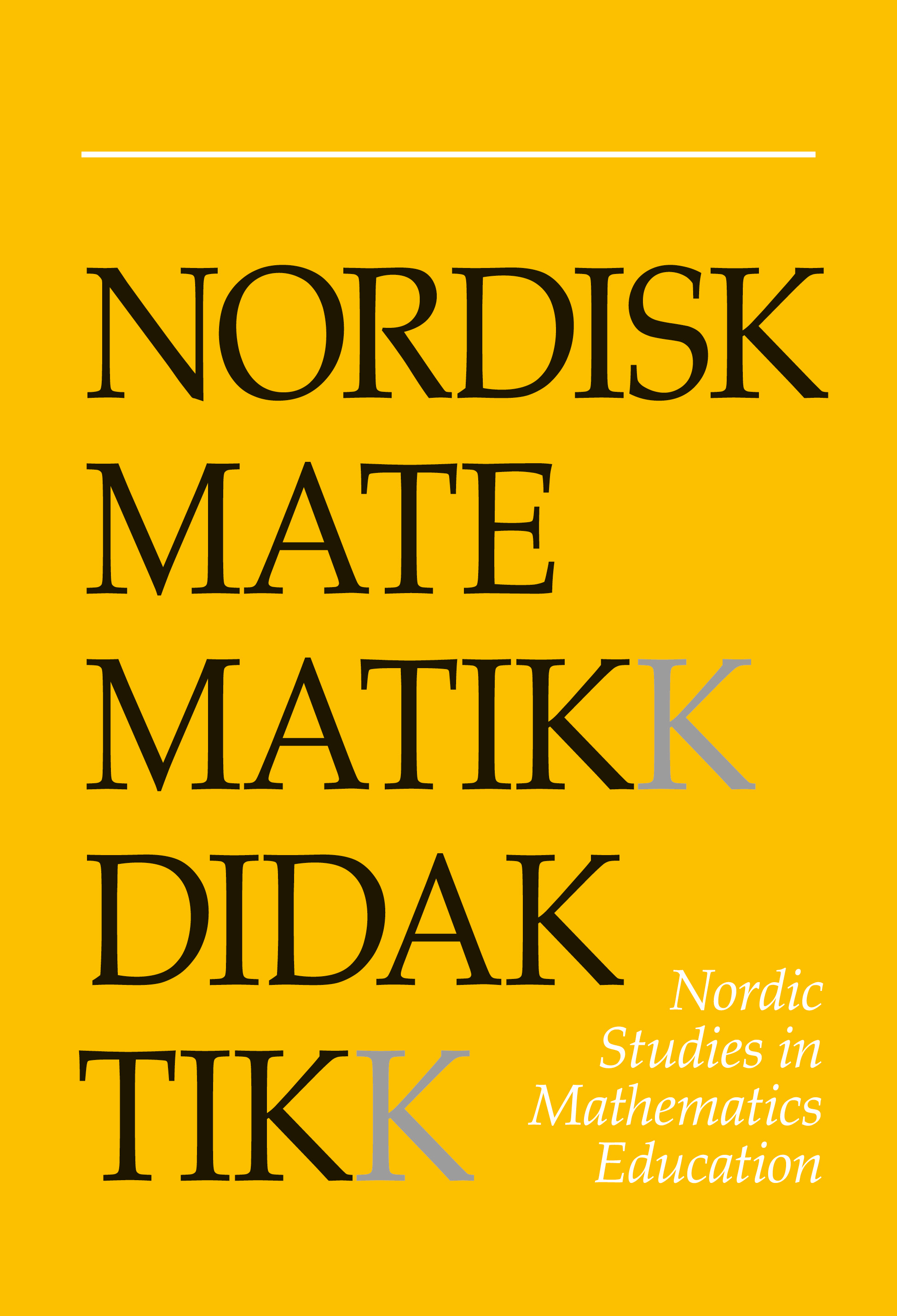Practice-based research on mathematics teaching: A developmental turn?
DOI:
https://doi.org/10.7146/nomad.v26i3-4.149178Abstract
When I began my career in mathematics education research in the early 2000s, I was fascinated by a number of what were, at the time, recent and emerging studies of mathematics teaching ...
References
Askew, M., Brown, M., Rhodes, V., Wiliam, D. & Johnson, D. (1997). Effective teachers of numeracy. King's College, University of London.
Bakker, A. (2018). Design research in education: a practical guide for early career researchers. Routledge. https://doi.org/10.4324/9780203701010
Ball, D. L. & Bass, H. (2003). Toward a practice-based theory of mathematical knowledge for teaching. In B. Davis & E. Simmt (Eds.), Proceedings of the 2002 annual meeting of the Canadian Mathematics Education Study Group (pp. 3-14). Canadian Mathematics Education Study Group.
Ball, D. L., Thames, M. H. & Phelps, G. (2008). Content knowledge for teaching: What makes it special? Journal of Teacher Education, 59, 389-407. https://doi.org/10.1177/0022487108324554
Borko, H. (2004). Professional development and teacher learning: mapping the terrain. Educational Researcher, 33 (8), 3-15. https://doi.org/10.3102/0013189X033008003
Broer, M., Bai, Y. & Fonseca, F. (2019). Socioeconomic inequality and educational outcomes: evidence from twenty years of TIMSS. Springer. https://doi.org/10.1007/978-3-030-11991-1
Burkhardt, H. & Schoenfeld, A. H. (2003). Improving educational research: toward a more useful, more influential, and better-funded enterprise. Educational Researcher, 32 (9), 3-14. https://doi.org/10.3102/0013189X032009003
Cobb, P. & Jackson, K. (2015). Supporting teachers' use of research-based instructional sequences. ZDM, 47 (6), 1027-1038. https://doi.org/10.1007/s11858-015-0692-5
Coburn, C. E. & Penuel, W. R. (2016). Research-practice partnerships in education: outcomes, dynamics, and open questions. Educational Researcher, 45 (1), 48-54. https://doi.org/10.3102/0013189X16631750
Gitomer, D. (2009). Crisp measurement and messy context: a clash of assumptions and metaphors - Synthesis of section III. In G. Drew (Ed.), Measurement issues and assessment for teaching quality (pp. 223-233). Sage. https://doi.org/10.4135/9781483329857.n13
Gutierrez, R. (2013). The sociopolitical turn in mathematics education. Journal for Research in Mathematics Education, 44 (1), 37-68. https://doi.org/10.5951/jresematheduc.44.1.0037
Hill, H. C. (2007). Mathematical knowledge of middle school teachers: implications for the No child left behind policy initiative. Educational Evaluation and Policy Analysis, 29 (2), 95-114. https://doi.org/10.3102/0162373707301711
Hill, H. C., Blunk, M.L., Charalambous, C. Y., Lewis, J. M., Phelps, G. C. et al. (2008). Mathematical knowledge for teaching and the mathematical quality of instruction: an exploratory study. Cognition and Instruction, 26 (4), 430-511. https://doi.org/10.1080/07370000802177235
Huang, R., Takahashi, A. & Ponte, J. P. da (2019). Theory and practice of Lesson study in mathematics: an international perspective. Springer. https://doi.org/10.1007/978-3-030-04031-4
Korthagen, F. A. J. (2010). The relationship between theory and practice in teacher education. International Encyclopedia of Education, 7, 669-675. https://doi.org/10.1016/B978-0-08-044894-7.00638-2
Korthagen, F. A. J. & Kessels, J. P. A. M. (1999). Linking theory and practice: changing the pedagogy of teacher education. Educational Researcher, 28 (4), 4-17. https://doi.org/10.2307/1176444
Krainer, K. & Llinares, S. (2010). Mathematics teacher education. International Encyclopedia of Education, 7, 702-705. https://doi.org/10.1016/B978-0-08-044894-7.00680-1
Learning mathematics for teaching project (2011). Measuring the mathematical quality of mathematics teaching. Journal for Mathematics Teacher Education, 14 (1), 25-47. https://doi.org/10.1007/s10857-010-9140-1
Lerman, S. (2000). The social turn in mathematics education research. In J. Boaler (Ed.), Multiple perspectives on mathematics teaching and learning (pp. 19-44). Ablex. https://doi.org/10.5040/9798400688362.0005
Lesh, R. & Zawojewski, J. S. (2007). Problem solving and modeling. In F. Lester (Ed.), Second handbook of research on mathematics teaching and learning (pp. 763-802). Information Age.
Lindquist, J. (2012). Time to grow them: practicing slow research in a fast field. JAC, 32 (3/4), 645-666.
Ma, L. (1999). Knowing and teaching mathematics: teachers understanding of fundamental mathematics in China and the United States. Lawrence Erlbaum. https://doi.org/10.4324/9781410602589
Maass, K., Cobb, P., Krainer, K. & Potari, D. (2019). Different ways to implement innovative teaching approaches at scale. Educational Studies in Mathematics, 102, 303-318. https://doi.org/10.1007/s10649-019-09920-8
Marton, F. & Booth, S. (1997). Learning and awareness. Lawrence Erlbaum.
Praetorius, A.-K. & Charalambous, C. Y. (2018). Classroom observation frameworks for studying instructional quality: looking back and looking forward. ZDM, 50, 535-553. https://doi.org/10.1007/s11858-018-0946-0
Radford, L. (2016). Language in mathematics education research. In Á. Gutiérrez, G. C. Leder & P. Boero (Eds.), The second handbook of research on the psychology of mathematics education (pp. 275-313). Springer. https://doi.org/10.1007/978-94-6300-561-6_8
Seino, T. & Foster, C. (2020). Analysis of the final comments provided by a knowledgeable other in lesson study. Journal of Mathematics Teacher Education. https://doi.org/10.1007/s10857-020-09468-y
Skott, J. (2017). Patterns of participation. A participatory account on learning to teach. In A. Qvortrup & M. Wiberg (Eds.), Dealing with conceptualisations of learning (pp. 133-143). Sense. https://doi.org/10.1007/978-94-6351-029-5_10
Stengers, I. (2018). Another science is possible: a manifesto for slow science. Wiley.
Stigler, J. & Hiebert, J. (1999). The teaching gap: best ideas from the world's teachers for improving education in the classroom. The Free Press.
Warwick, P., Vrikki, M., Vermunt, J. D, Mercer, N. & Halem, N. van (2016). Connecting observations of student and teacher learning: an examination of dialogic processes in Lesson study discussions in mathematics. ZDM, 48 (4), 555-569. https://doi.org/10.1007/s11858-015-0750-z
Downloads
Published
How to Cite
Issue
Section
License

This work is licensed under a Creative Commons Attribution-NonCommercial-ShareAlike 4.0 International License.



